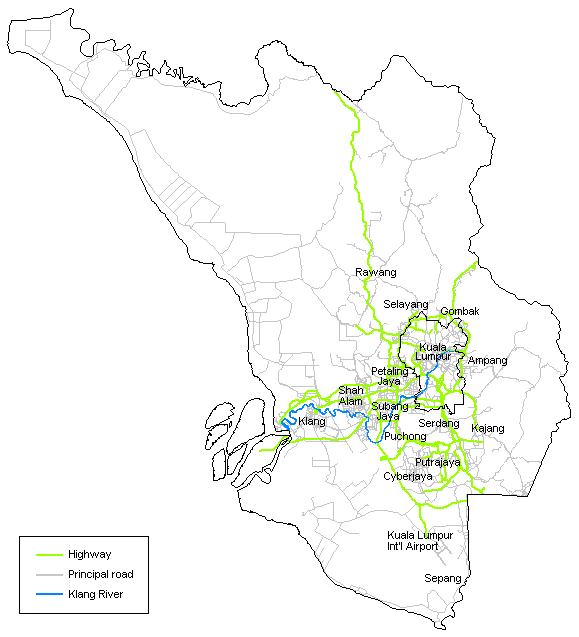Klang Valley

2°40′54.05″N 101°39′40.57″E / 2.6816806°N 101.6612694°EKlang Valley (Malay: Lembah Klang) is an urban agglomeration in Malaysia that is centered in the federal territories of Kuala Lumpur and Putrajaya, and including their adjoining cities and towns in the state of Selangor. It is the urban area of the much larger Kuala Lumpur metropolitan area, known as Greater Kuala Lumpur.
The Klang Valley is geographically delineated by the Titiwangsa Mountains to the east and the Strait of Malacca to the west. It extends to Rawang in the northwest, Semenyih in the southeast, and Klang and Port Klang in the southwest.[1] The conurbation is the heartland of Malaysia's industry and commerce.[2] As of 2022, the Klang Valley is home to roughly 9 million people.[3]
Origin
[edit]The valley is named after the Klang River, the principal river that flows through it that starts at Klang Gates Quartz Ridge in Gombak and flows into the Straits of Malacca in Port Klang, The river is closely linked to the early development of the area as a cluster of tin mining towns in the late 19th century. Development of the region took place largely in the East-West direction (between Gombak and Port Klang) but the urban areas surrounding Kuala Lumpur have since grown north and south towards the border with Perak and Negeri Sembilan respectively.
Regions
[edit]There is no official designation of the boundaries that make up the Klang Valley but it is often assumed to comprise the following areas and their corresponding local authorities:

Core Constituencies in the Klang Valley
Constituencies in the Greater Klang Valley (including the Rawang and Langat River Valley)
Sometimes included (for TV and radio broadcasting)
Course of the Klang River is shown in blue.
- Federal Territory of Putrajaya
- Federal Territory of Kuala Lumpur
- Selangor district of Petaling
- Selangor district of Klang
- Selangor district of Gombak
- Selangor district of Hulu Langat
- Selangor district of Sepang
- Selangor district of Kuala Langat
Transport
[edit]Even though the Klang Valley officially consists of separate cities and suburbs, integration between these cities is very high, with a highly developed road network and an expanding integrated rail transit system. Many expressways criss-cross the metropolis making cars the most convenient way to get around. However, this has led to the Klang Valley's notorious traffic jams which span whole kilometres of expressways and make driving during peak hours exhausting. Since the 1990s, new rail systems, such as Rapid KL's light rapid transit (LRT), mass rapid transit (MRT), KTM Komuter, ERL's airport rail links and a monorail have been developed. Most of these systems have gone through extensive expansion as a superproject. The Klang Valley Integrated Transit System, as of now, is currently being upgraded to include a new MRT line and LRT line, as well as a monorail serving Putrajaya. Buses that operate around Klang Valley are also extensive.
In 2024, National Defence University of Malaysia associate professor Wu Chai Bin believed that the traffic jams in Klang Valley would be relieved in 10 years by improving the public transportation network.[4][5]
See also
[edit]- 1998 Klang Valley water crisis
- Greater Kuala Lumpur
- Kuala Lumpur
- List of metropolitan areas in Asia by population
- Public Transport in Klang Valley
References
[edit]- ^ Ooi Keat Gin (2009). Historical Dictionary of Malaysia. Scarecrow Press. pp. 157–158. ISBN 978-0810859555. Archived from the original on 2015-06-04.
- ^ "world gazetteer". Archived from the original on 2012-12-05.
- ^ "World Gazetteer: Malaysia - largest cities (per geographical entity)". world-gazetteer.com. 9 February 2013. Archived from the original on 9 February 2013.
- ^ "专家:巴生谷300万车主 未来10年继续塞!(Expert: three million car owners in Klang Valley will continue to experience traffic jams in the next ten years)". China Press. 4 June 2024. Archived from the original on 4 June 2024. Retrieved 4 June 2024.
- ^ Nizam, Fitri (4 June 2024). "3 juta hadap sesak 10 tahun lagi (Three million is expected to experience traffic jams for another 10 years) (subscription required)". Utusan Malaysia. Archived from the original on 4 June 2024. Retrieved 4 June 2024.